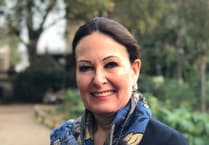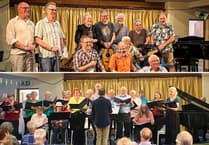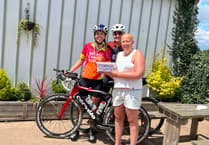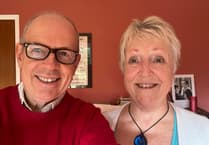SO many changes in William Pickard’s life. A man who grew up working horses on the land, who walked to school, who now looks out at the new wind turbines from his home but who can’t get a mobile signal.
William Pickard was 90 on Sunday, June 25. His family booked Bow Village Hall and posted an invitation for everyone to attend the party. And they did, giving William a rousing cheer after he cut the cake.
He was born on June 25, 1927, between two World Wars. His father was Percival William, his mother Florence Isabel. His grandfather had lived at Appledore Farm, Bow, for a time before moving to the Barton at Nymet Tracey beside the church.
William jokes that if being born within sound of Bow bells makes a Londoner a Cockney, then what does being born with the sound of the bells of Bow church make him?
His father went to Australia in 1910, returning to Bow in 1921. He and Florence were married in Australia, Florence having followed him later. William, their youngest, was their only child born in this country. He had a brother and two sisters.
William went to school in Bow, the building opposite the village hall that is now two houses. He finished his schooling at North Tawton, then worked on the farm.
“We had four horses and Dad bought the first tractor in 1940, a Standard Fordson and I think he paid £145 for it,” said William.
“Before I left school I would catch moles, pinning their skins to the barn door to dry. As soon as they had dried, I would send the skins to Horace Friend in Wisbech, Cambridgeshire.
“Lots of farms did that then, there were a lot more moles about too,” said William.
He remembers that during the war they were told not to put all their hay ricks together but to space them out.
Then they were milking about a dozen cows and William and his brother would deliver milk by horse and trap, starting outside the village so that by the time they got to the square in Bow it was time for William to go to school.
He remembers that his first school teacher was Mrs Foley whose husband was the cobbler having a shop opposite the Kings Arms. Bow also had a dressmaker and at least two bakers, two petrol stations, the railway station and the Railway Inn, long since closed, as was the station.
He remembers the market, saying that every village used to have a cattle market and remembers the big markets at Crediton. His special interest was the Red Devons.
William joined the Young Farmers Club in Bow. He became social secretary, then vice chairman, chairman, Club Leader and, for 30 years, was club president. His late wife, Hazel, had also been a YFC member, they were married in 1960. Hazel died last year.
They had five children - Ann, Andrew, Timothy, Mary and Emma. Two live in Crediton, one in Cornwall, Mary is in Bow and Timothy in Australia. William has eight grandchildren.
William has been much connected with life in Bow, so much so that he was given, in jest, the friendly title of Mayor of Bow.
He was a church warden for 20 years, chairman of Bow Cubs and the Scouts, a Governor and for some time chairman of Governors at the Primary School, both at the old site and where it is now.
In 1965 he donated a trophy to the school for the William Pickard Relay Race, a complicated race that involves all ages in the school and is still run today.
He still works with the school and visits often. The biggest birthday card he received was from the school, six pages of A3, signed by everyone in the school.
One of his proudest achievements was the designation in 1990 of the marsh at the farm as a Site of Special Scientific Interest, an SSSI, which William still looks after today. It is still one of only two undisturbed examples in Devon.
He and Hazel retired from the farm 17 years ago, William still living in their house on the edge of Bow looking out over farmland.
Sue Read





Comments
This article has no comments yet. Be the first to leave a comment.